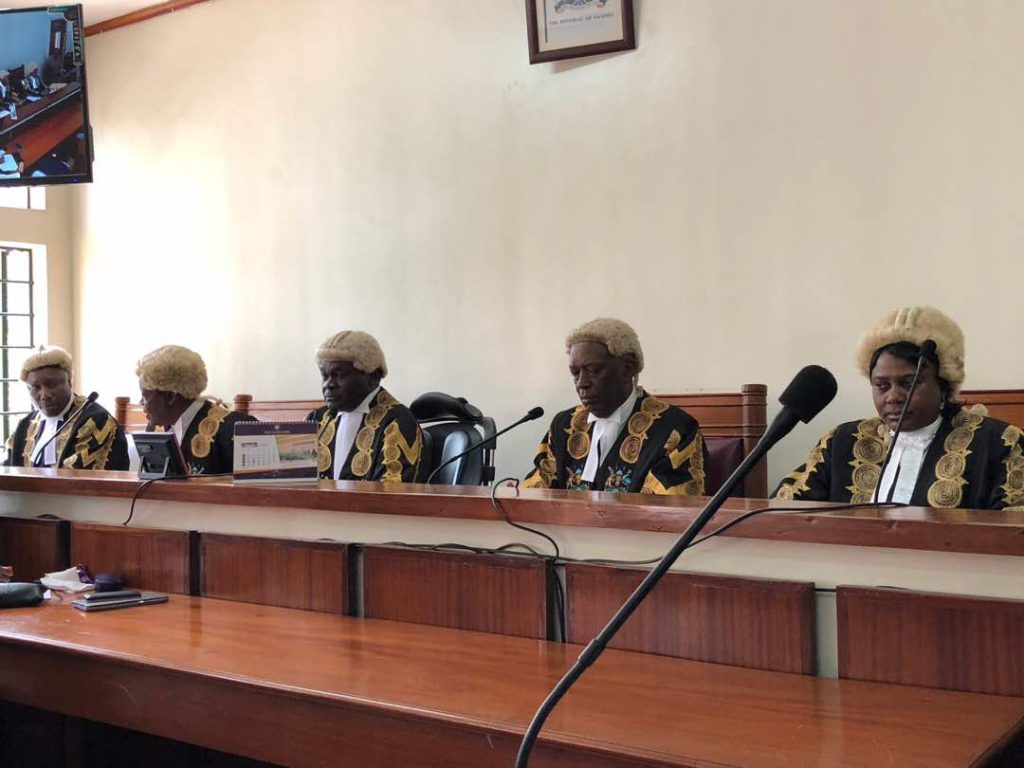In this part, we continue to delve into the sad reality that has seen the public confidence in the courts of judicature in Uganda, continue to be eroded.
Another right that continues to be violated is freedom of expression. Member of Parliament for Kyadondo East Constituency Robert Kyagulanyi and others are currently facing charges of intending to annoy the President an offense established under Section 24 of the Penal Code Act Cap 120. These charges stem from allegations that during a campaign for a by-election in August 2018, the president’s convoy was allegedly stoned by opposition supporters. Another example is Dr. Stella Nyanzi who was recently convicted of cyber harassment contrary to Section 24 of the Computer Misuse Ac 2011, stemming from a poem she shared on Facebook in September 2018 with remarks which the prosecution claimed violated the president’s privacy. The reaction of the court attendees at the final hearing of Dr. Stella Nyanzi’s case which was characterized by members hurling insults at the Magistrate to the extent of throwing an empty bottle a her face was a clear indication of how there is no public trust in the judiciary especially when handling matters containing political components and human rights violations.
The Right to property has also been violated by judicial officers hence affecting public trust in the judiciary. During adjudication of land disputes, judicial officers have mishandled cases, failed to visit locus quo which is essential in land matters, caused unnecessary delay resulting into loss of property, illegal evictions both issues which continue to undermine public confidence in the judiciary. In Bufumbo village, in Mbale Municipality over 800 families were evicted in February 2018 by Uganda Investment Authority (UIA) even before the matter was resolved by the court and the land handed over to a Chinese company to create an industrial park. President Museveni launched the project on 11 March 2018 and warned the remaining squatters to vacate government land.
Corruption and Abuse of office have also undermined public confidence in the judiciary. Although judicial corruption is notoriously difficult to prove, several investigations and studies have consistently ranked the Judiciary as one of the most corrupt institutions in the country. Corruption in the judiciary takes forms of bribery, mishandling cases intentionally, unnecessary delays in handling cases, interfering with the judicial process ad circumvention of due process of law. According to a study conducted by the Centre for Public Interest Law, a Magistrate was said to have been so blatant that he opted to hear the case of the defendant first even when the rules dictate that it is the plaintiff to first present his case. In many Magistrates’ courts, litigants are allegedly punished for hiring lawyers to process bail applications. This is taken as denying the Judicial Officers an opportunity to directly extort money from prisoners.
A judicial officer cannot be independent or impartial while being corrupt and because of this corruption remains one of the biggest challenges facing the judiciary and affecting the exercise of judicial independence. Corruption undermines the efficient and effective administration of Justice as well as public confidence in the judiciary.
Public awareness of the judicial system. Individual perceptions about the performance of the judicial officers are not only shaped by their personal experiences with the courts but also by the information received from the media however most Ugandans lack knowledge of the technical aspects regarding the procedure and law surrounding the court system.
The more informed the individual, the more likely that s/he will understand how the judicial process works. Such high levels of knowledge about the judiciary will create stronger attitudes about the impartiality, incorruptibility, and trustworthiness of the judiciary. Individuals who are ignorant about the law and court procedures are not confident that judges can be independent in exercising their judicial duties and this jeopardizes the legitimacy of courts especially in such a country where the judiciary is not completely independent from political influence.
In conclusion, Justice requires that everyone is entitled to a fair and public hearing by a competent, independent and impartial tribunal, under the principles in the Universal Declaration of Human Rights and the International Covenant on Civil and Political Rights. This can only be achieved if there is respect for the independence of the judiciary which is lacking in Uganda. The selection of judges must be based on merit and persons selected for the judicial office must be individuals of integrity and ability with appropriate training or qualifications in law which qualifications should be exhibited in the performance of their duties.
There is a need to hold the judiciary accountable in the performance of their duties relating to the protection and promotion of Human Rights. Human rights defenders and activists work towards exposing all forms of injustice, holding public offices accountable and seek for good governance. They need to be protected and their human rights as granted by international law and the Constitution of the Republic of Uganda respected especially freedom of expression and assembly. There is a need for a balance between judicial independence and accountability to be maintained in order or public confidence in the judiciary to be upheld by all citizens. To avoid public chaotic reactions to judgments and decisions of the court, judicial officers need to elaborate principles of law in the course of resolving disputes and for matters containing political components, independence and integrity need to be upheld. The public must have faith not only in the intellectual ability of judges but also in their fairness, impartiality, and incorruptibility.
The writer is a law advocate in the republic of Uganda, actively in practice within the Ugandan jurisdiction.

